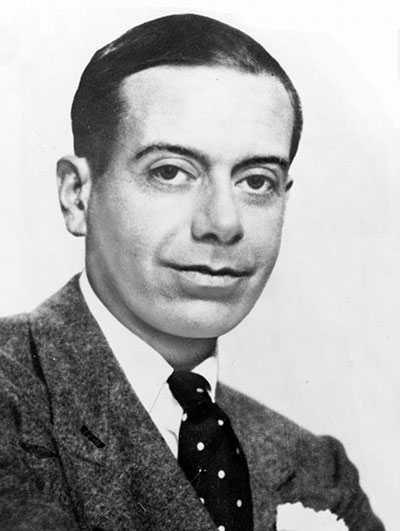Background
Cole Albert Porter was born on June 9, 1893 in Peru, Indiana, into a wealthy family, to Samuel Fenwick Porter and Kate.

Farmhouse at Westleigh Farms
Porter as a Yale College student
Porter and Jean Howard in early 1954
Porter family gravesite in Peru, Indiana

Cole Albert Porter was born on June 9, 1893 in Peru, Indiana, into a wealthy family, to Samuel Fenwick Porter and Kate.
He was educated at the East Worcester School for Boys, Yale University, and the Harvard Music School, and also studied under Vincent d'Indy, the French composer, at the Schola Cantorum in Paris.
After his first success, "Esmeralda", he produced his first Broadway production, "See America First", in 1916, which was a commercial failure.
In 1917, just before the United States entered the World War I, he moved to Paris to work with the "Duryea Relief Organization". He also claimed to have served in the French Foreign Legion, a military service wing of the French Army exclusively created for foreign nationals willing to serve in the French Armed Forces.
He earned his first big breakthrough with the song, "Old-Fashioned Garden", which was featured in the revue, "Hitchy-Koo", in 1919. The next year, he composed a number of tunes for "A Night Out", a musical.
He composed a short ballet in conjunction with Gerald Murphy titled, "Within the Quota", in 1923. The next year, he found much less success with his show "Follies". During this time, his songs were diminishing in popularity on Broadway.
In 1928, he reintroduced himself to Broadway and earned his first commercial hit with "Paris", which was commissioned to him by E. Ray Goetz. One of his best-known songs, "Let’s Do It" was featured in the show.
He composed the songs and wrote the lyrics for the musical revue, "Wake Up and Dream", which opened in 1929. However, due to the Wall Street Crash, there were not many shows for the same. One of the songs in the lampoon titled, "What Is This Thing Called Love?" became immensely popular.
Through the 1930s, he had a number of hits with shows like "The New Yorkers", "Gay Divorcee", "Jubilee" and "Dubarry was a Lady". During this period, he also wrote the scores for the films, "Rosalie" and "Born to Dance".
After a brief hiatus from work due to a fatal injury, he wrote the scores for "Broadway Melody of 1940" and "You’ll Never Get Rich".
He came back with his biggest hit, "Kiss Me Kate", in 1948, which was followed by "Anything Goes". The same year, he wrote the song for Gene Kelly/Judy Garland musical, "The Pirate".
In 1956, he delivered his last major hit, "True Love" in the musical, "High Society", which featured Bing Crosby, Frank Sinatra and Grace Kelly.
He died very unexpectedly after a kidney failure in Santa Monica, California. He is interred between his mother and father in Peru, Indiana.
"Kiss Me, Kate", which debuted on Broadway in 1948, is to date, considered Porter’s magnum opus. It was the first show where he wrote the music and lyrics in association with the script and it proved to be one of the most rewarding masterpieces of his career. The musical went on to win a number of Tony Awards and earned its first one in 1949. It was also his only show that had more than a 1,000 performances on Broadway.
He was posthumously inducted into the Songwriters Hall of Fame, in 1970.
He was posthumously awarded a Star on the Hollywood Walk of Fame, in 2007.
Quotations:
"All the world loves a clown."
"In olden days a glimpse of stocking was looked on as something shocking but now, God knows, anything goes."
"Good authors, too, who once knew better words now only use four-letter words writing prose... anything goes."
He was homosexual.
In 1937, he was badly injured after a horseback riding injury and suffered nerve damage, along with damaged legs. He was hospitalized for nearly two years and had to be restricted to a wheelchair for five years. He also needed nearly 30 surgeries to save his legs over two decades.
After numerous surgeries, he still suffered from pain in his legs and his right leg had to be amputated. He refused to wear an artificial limb. He went through a phase of depression during this time and started to depend on alcohol.
He married a well-off Kentucky divorcee, Linda Lee Thomas on December 18, 1919. This was only a marriage "by contract".
